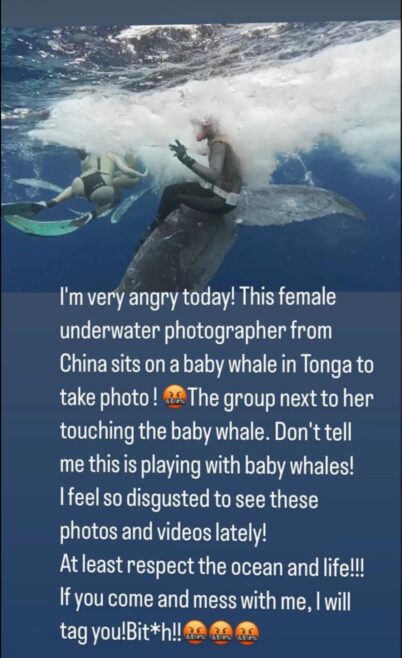A photo allegedly showing a swimmer riding the tail of a baby whale has sparked outrage in Tonga.

If this is proven to be true, the swimmer’s action may have violated Tonga’s Whale Watching and Swimming law Section 9, which states, “No person shall disturb or harass any whale.” It also says, “No person shall touch or feed any whale.”
It comes after growing concerns in the Pacific with authorities warning this week about abusive swimming activities toward whales, especially mother-calf pairs.
The photo, widely shared on social media, shows a person apparently sitting on the tail while another was swimming nearby on the left side.
The caption, accompanied by the image, said a group of swimmers also touched the whale.
Kaniva News could not independently verify the photo’s authenticity and whether it was indeed taken in Tonga.
Swimming with whales
Tonga offers regulated opportunities for swimming with whales in small groups.
However, the rules said the whales’ behaviour must be considered to decide whether swimming with them should be discontinued.
The practice “is entirely at the captain’s discretion”.
Four swimmers can swim with whales at one time, one report says.
According to Tonga’s Whale Watching and Swimming Law, swimmers are not allowed to come into contact with any whale at any sign of the animal becoming disturbed or alarmed.
“No person shall cause any whale to become separated from a group of whales or cause any members of such a group to be scattered”, it said.
Social media reactions
The photo triggered outrage and frustration among people passionate about whale conservation and raised serious concerns among local community members.
“I am very angry today! This female underwater photographer from China sits on a baby whale in Tonga to take photo”, the caption accompanying the photo claimed.
However, it did not provide evidence to indicate that it was indeed a Chinese swimmer who was allegedly sitting on the whale.
“I feel so disgusted to see these photos and videos lately”.
A commenter responded: “This is what we are fighting for here in Tonga, especially here in Vava’u…. Maybe it’s better to leave the whales alone”.
“Disrespect”, some commenters wrote.
Another commenter said that the individual responsible for taking the swimmers should be held accountable for their actions and face appropriate consequences.
“Their licenses should be taken off them with no second chances”.
“I think there are rules that prohibit this. The operator should be penalized”, one commenter wrote.
Some commentators, however, expressed concerns that labelling the swimmer in question as Chinese might fuel racism issues.
“I think it’s not Good for you to point out here that the problems get resolved between the operators instead of putting them on social media; it affects the reputation of the whale-watching industry of Tonga,” the commenter wrote.
“Not only that, you have pointed out the Chinese tourist, which pretty much single them out by race, it’s sad you’re only nice to the white skin people and throws these people under the bus same rules should apply to everyone, not one set of rules for the Asians especially the Chinese and one set of rules for the white people.
One commenter was suspicious about the photo and asked whether it was photoshopped.
Stricter regulations
The news comes after the Mauritius island authority called for “enforcing stricter regulations due to an influx of influencers from China and Taiwan seeking viral social media photos of themselves swimming with whales.”
The authority said the situation “has led to chaos in cetacean habitats, disrupting breeding whales.
Mauritius has now implemented a ban on swimming with whales, imposing hefty fines and jail time for offenders.
Last month, it was reported that French Polynesian environmental associations and some scientists have criticised the boom in whale-watching activities.
The country’s conservation group Mata Tohora, dedicated to protecting marine mammals, expresses concern over the excessive number of boats in the water.
“We need to limit the number of boats around the whales and dolphins. It’s a question of managing the activity, which needs to be done quickly, said Agnes Benet, a biologist and founder of the association.
“You can swim with the whales without disturbing them,” she added.
The association is campaigning for the introduction of a “no whale-watching” period, from 2:00 pm onwards, to allow them to rest.







